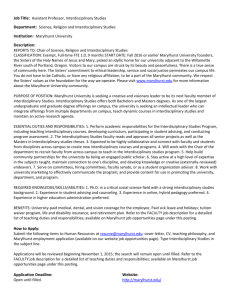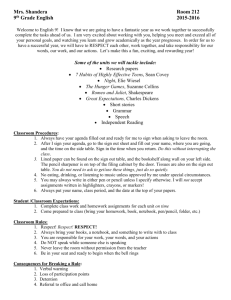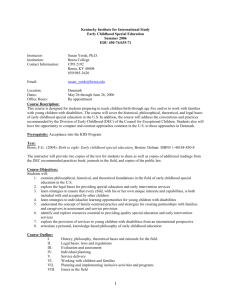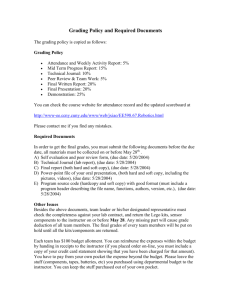Course Number: CPR 301E or CPR 001E or WR 310E Course Title
advertisement
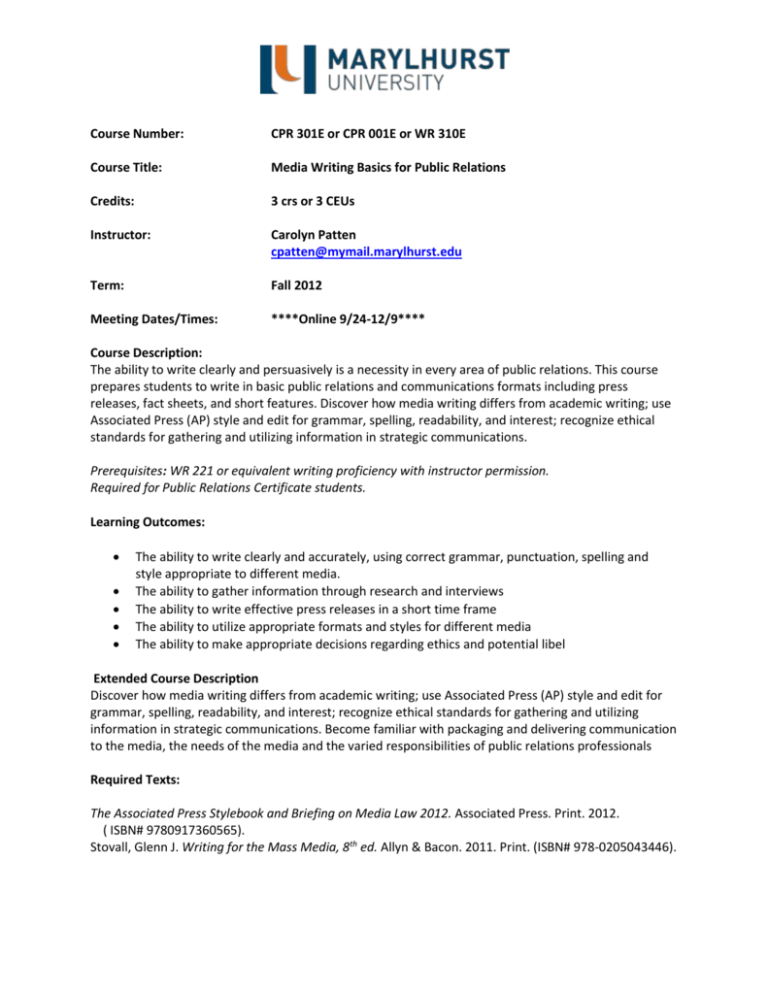
Course Number: CPR 301E or CPR 001E or WR 310E Course Title: Media Writing Basics for Public Relations Credits: 3 crs or 3 CEUs Instructor: Carolyn Patten cpatten@mymail.marylhurst.edu Term: Fall 2012 Meeting Dates/Times: ****Online 9/24-12/9**** Course Description: The ability to write clearly and persuasively is a necessity in every area of public relations. This course prepares students to write in basic public relations and communications formats including press releases, fact sheets, and short features. Discover how media writing differs from academic writing; use Associated Press (AP) style and edit for grammar, spelling, readability, and interest; recognize ethical standards for gathering and utilizing information in strategic communications. Prerequisites: WR 221 or equivalent writing proficiency with instructor permission. Required for Public Relations Certificate students. Learning Outcomes: The ability to write clearly and accurately, using correct grammar, punctuation, spelling and style appropriate to different media. The ability to gather information through research and interviews The ability to write effective press releases in a short time frame The ability to utilize appropriate formats and styles for different media The ability to make appropriate decisions regarding ethics and potential libel Extended Course Description Discover how media writing differs from academic writing; use Associated Press (AP) style and edit for grammar, spelling, readability, and interest; recognize ethical standards for gathering and utilizing information in strategic communications. Become familiar with packaging and delivering communication to the media, the needs of the media and the varied responsibilities of public relations professionals Required Texts: The Associated Press Stylebook and Briefing on Media Law 2012. Associated Press. Print. 2012. ( ISBN# 9780917360565). Stovall, Glenn J. Writing for the Mass Media, 8th ed. Allyn & Bacon. 2011. Print. (ISBN# 978-0205043446). Assessment & Evaluation: Discussion Forums - expectations and grading Many of us have gotten used to opening an email the moment it arrives, firing off an answer without a second thought, and sending multiple emails to clarify a request or decision. This often carries over into the Discussion Forums, where students are more likely to send the first thing that comes to mind rather than doing a first draft, checking it and then sending it. This doesn’t have to take a lot of time. It will make sure that you are always focused on the quality and meaning of your posts. When you shift your perspective to view each email you write as a communication with a purpose, audience and context, you will find that your communication almost automatically becomes more effective and you are taken more seriously. On the whole, it’s important to remember that professional emails differ substantially from personal emails. Don’t waste your time or the recipient’s time on emails that ramble, leave out crucial information, are full of errors, make the recipient guess at your meaning and request or are inappropriately casual. Appropriate email communication is a vital part of a public relations practitioner’s toolbox. As such, online comments and questions will be graded for AP style, correct use of language and content. When you write a post, take a few minutes to use the post box tool bar to check your spelling and grammar, and then proofread it. Discussion posts that do not show evidence of this will be marked down. Students are expected to be involved in discussions, responding to the discussion topics and interacting with fellow students in the discussion. The class is intended to be an interactive forum, where students can discuss the readings, writing assignments and weekly topics among themselves, with the instructor acting as moderator. Students are encouraged to direct questions and discussions to the class at large. It is important to participate in the online discussions throughout the week, responding to questions and posing questions of your own to the instructor and other students. A minimum of two substantive posts each week are required to obtain an A in the Discussion portion of the class. Substantive posts are those that add to the discussion with thoughtful comments, pose useful questions or offer additional information based on personal and professional experience. The instructor will not respond to every student comment or question, but will follow the online discussions daily and will answer discussion questions as needed. Writing Assignments -- Submission format, expectations and grading Format for submitting writing assignments 1. Label your document file with your last name, the week and the class designation – for example: JonesWeekOne466.doc. Remember to include your name and the appropriate week on the document itself. 2. Save your work and submit it as a document. Do not submit pdf files or files with imbedded graphics. 3. For each week, submit the writing assignment (even if there are two or more parts of the assignment) in one document only. 4. Always submit to the correct week’s Assignment area. Do not send assignments through course mail. 5. Five points will be deducted from the grade for each paper that does not follow this format. 6. Writing assignments are due each Monday at 9 a.m. Unless you have arranged for a late submission, 10 points will be deducted for each day late. For example, a paper received at 10 a.m. on Monday will lose 10 points. Papers received at any time on Tuesday will lose an additional 10 points, and so on. 7. All rewrites should be submitted to the original week’s assignment area. If you turning in a rewrite for Week Three, upload it into the Week Three assignment are. 8. All assignments must be written in Associated Press style. Correct spelling and grammar are essential. Aim for brevity and clarity. Use spell check and ask a colleague to proofread. Review each written assignment description at the beginning of the week and ask for any clarification you need to make the assignment easier. Weekly writing assignments -- 1,000 points possible Papers due Weeks 2-11 100 points per paper Note: Papers that are turned in by the due date may be rewritten and considered for a higher grade if the rewritten version is submitted by the following Monday at 9 a.m. Papers that are late without prior approval will lose 10 points for every late day. Weekly Class Discussions -- 500 points possible Discussions due Weeks 1-10 50 points per week Two substantive posts are due by Friday at 9 a.m. and are required to receive an average grade in the discussion portion of class. Late posts will receive no more than 15 points per week. Please make your posts early enough so that your fellow students will have time to respond with their own posts. Each student is expected to post at least one original response to the discussion question and one response to another student’s original post. Obviously, if everyone posts at the last minute, it will not be possible to respond to others’ posts by the deadline. Students who habitually post late hurt the class flow and will not receive full credit for their posts. Your final grade will be determined using the Marylhurst University Grading Scale: Grade A AB+ B B- Points 1425 to 1500 1350 to 1424 1312 to 1349 1237 to 1311 1200 to 1236 Grade C+ C CD F Points 1162 to 1199 1087 to 1162 1050 to 1086 900 to 1049 0 to 899 IF YOU ARE ENROLLED FOR CONTINUING EDUCATION UNITS (CEUS): The requirements detailed in this syllabus (learning outcomes, readings, attendance and participation, assignments and assessment) apply to all students whether enrolled for college credit or continuing education units (CEUs). To complete this course and receive a “CE” (meaning “completed”) on your transcript, CEU students must meet or exceed requirements for a “B” grade as indicated under “Assessment and Evaluation.” CEU students who fail to meet requirements for a “B” or better grade will receive a “NC” (meaning “not completed”) on their transcript. CEU coursework applicable to a Professional Certificate must receive a “CE” grade. If you have questions about how your work for this course will be assessed, please contact your instructor. Course Outline: Week One – Introductions and AP Stylebook -- Initial Essay During this first week, each student will write a brief essay that will help the instructor understand the student’s level of familiarity with media communication methods and how they are used in different areas of public relations. The essay will not be graded for content or style. However, the essay is required. Week Two Week Three Week Four Week Five Week Six Week Seven Week Eight Week Nine Week 10 Week 11 Becoming familiar with AP style Basics: Attribution, accuracy, audience and angles Basics: Ethics and plagiarism, inverted pyramid style, boilerplate, heads and subheads Revisions and review Leads, linking and summaries Client fact sheet Pitching the story, targeting specific media and ethics in persuasion Client Backgrounder Interviewing and feature writing Final Project – Revisions Teaching Philosophy & Methodology: To a great extent, student work will be evaluated on how well it meets “industry standards.” The industry is the public relations profession in this country, and the standards are those that are generally expected of entry-level PR practitioners. Comments, grades and desired learning outcomes focus on helping every student achieve this level of professionalism. Students are not in competition with one another and there is no “grading on the curve.” Schedule: The rhythm of an online course is very different from on-campus courses. Rather than one class meeting per week, the course activities are distributed over a week to allow for flexibility in participation. Students and instructors may make postings to the course around the clock. Regular participation in discussion board assignments and in all other parts of this course site is mandatory. Though work may be posted at any time of day or night, students need to be accountable to assignment deadlines spelled out in course assignment pages and course syllabus. “Office Hours” for the instructor: Sometimes there is no substitute for a real-time conversation, no matter how good we all are at written communications. I will be available for Skype calls Tuesday-Wednesday to discuss any questions you might have about class assignments or your work in general. Please email me through Moodle to set up a time before you call. All assignments are posted and available on Sunday for the coming week, so you should have plenty of time to review them. If you would rather ask questions in the Q and A Forum or to me directly through Moodle email, you can do so at any time, with the understanding that, on Saturday and Sunday, I will NOT be available to reply to questions on the assignments that are due on Monday. About the Instructor: Carolyn Patten is an Adjunct Professor in the Communications Department, teaching online classes and seminars in Writing for the Media, Public Relations Research and Planning and Crisis Communications, in addition to changing specialty seminars. Classes present professional practices and methods, using projects for real-world clients to reinforce learning. She began her career as a general assignment feature writer for the Santa Fe New Mexican and the Santa Fe Reporter. Later, as Executive Director for the non-profit Metropolitan Lawyer Referral Service in Denver, she began Colorado’s first legal advertising campaign; and later joined TCI as Editorial Director, helping to launch The Disney Channel and the cable industry’s first pay-per-view events. In California, she worked as Publication Director for three award-winning, satellite television trade industry publications, and served as Managing Editor of Palm Springs Life Magazine before joining The Ritz-Carlton, Rancho Mirage as Public Relations Director. She went on to become Tourism Public Relations Director for the City of Palm Springs, developing an international marketing program and launching the city’s first website. In Portland, she developed a complete re-branding and marketing campaign for Albertina Kerr Centers before launching a successful freelance writing and consulting career. As the owner of her own public relations business, she has handled full marketing and public relations for a varied group of consumeroriented clients, including hotels, restaurants, tourism destinations and attractions, boutiques, nonprofits and a winery. She is the author of the travel guidebook, “The Insider’s Guide to Palm Springs,” co-author of the travel guidebooks, “Hidden San Francisco & Northern California” and “Hidden Coast of California,” and continuing update author for the DK Eyewitness Travel Guides to California, Northern California, Los Angeles, Seattle and Hawaii. She is a regular writer for The Oregonian newspaper as well, contributing weekly and monthly columns and feature stories. The Mazatlan Hotel Association honored her with the Golden Deer 2009 Award for best international travel feature. She holds a Bachelor in Journalism from the University of Missouri and a M.A. in Mass Communications from the University of Denver. Her website is www.carolynpatten.biz University Policies and Procedures: Marylhurst Writing Standards: Writing is one of the central activities through which students learn, communicate, and demonstrate learning. Academic writing differs from other forms of writing in that it usually: is appropriately narrow in focus, presents an argument based on sound critical thinking, draws upon and properly acknowledges the work of others, and presents new understanding in an organized fashion. Unless otherwise indicated by the instructor, all writing in Marylhurst University classes, from electronic bulletin boards, to personal essays, to formal research papers, will be evaluated on the basis of Standard American English, quality, creativity, effectiveness of argumentation and reasoning, and accuracy of information. In addition, academic writing will be evaluated on the selection and use of appropriate supporting material. Documentation Style: Any information not original to the student must be cited in a recognized format—for example, APA, MLA, or Chicago—appropriate to the academic discipline. Preventing Plagiarism: Plagiarism is a form of academic dishonesty that occurs when a student uses information or material from outside sources without proper citation. Plagiarism is grounds for disciplinary action at Marylhurst. It is a student's responsibility to understand plagiarism and its consequences. Students should consult their instructor, their department chair, the Writing Center, or staff at Shoen Library if they have any questions about preventing plagiarism. Plagiarism occurs if: The student doesn’t cite quotations and/or attribute borrowed ideas. The student fails to enclose borrowed language in quotation marks. The student doesn’t write summaries and paraphrases in his/her own words and/or doesn’t document his/her source. The student turns in work created by another person (e.g., another student, downloaded from the internet, etc.). Students who submit or use their own prior work for a current course or work from one current course in another course without express permission from their professors may also be guilty of academic dishonesty. Consequences: If it is determined that a student has plagiarized or engaged in other forms of academic dishonesty, the student will likely fail the assignment and possibly the course, despite points earned through other work. Acts of academic dishonesty are reviewed for disciplinary action by the Provost. Engaging in plagiarism and other forms of academic dishonesty can result in dismissal from the University. For additional information, see “Academic Honesty” in the 2012-2013 Marylhurst Catalog and “Conduct Code” in the Student Handbook. Writing Resources: Marylhurst’s undergraduate and graduate programs have adopted a writing handbook, Diana Hacker’s A Writer’s Reference, 7th Edition, to help students develop their writing skills. The handbook can be accessed online at http://dianahacker.com/writersref/ or is available in the Marylhurst bookstore. Writing help is also available at the Marylhurst Writing Center that is located in the Shoen Library. Call for an appointment, 503.699.6277 or email writing@marylhurst.edu Student Rights and Responsibilities: All members of the Marylhurst community are expected to act in ways that foster the university’s primary function of education. Conduct that interferes with this educational responsibility will be dealt with directly. Please refer to the Marylhurst University Student Handbook, for specific information about student rights and responsibilities, as well as the policies and procedures. The Handbook is available online at: www.marylhurst.edu/studenthandbook For further information contact the Dean of Students at 503.534.4023 or deanofstudents@marylhurst.edu. Need For Accommodations: Students who experience disabilities are encouraged to contact the Coordinator of Accessibility and Disability Services at 503.636.8141, ext. 3344; 1.800.634.9982, ext. 3344; or email adaservices@marylhurst.edu for assistance in requesting classroom accommodation. IMPORTANT NOTICE REGARDING ACADEMIC POLICIES Course Completion: Students are expected to complete all courses for which they register. Dropping a Course: Students may drop a course without penalty until the published add/drop deadline. Withdrawal From A Course: Students who encounter unexpected difficulties after the add/drop deadline may officially withdraw from the course through the Office of the Registrar through the last scheduled class meeting (or last class date for online courses) as per the Schedule of Courses. Incomplete: An Incomplete (I) grade may be granted at the discretion of the instructor when: No more formal instruction is needed; At least 75% of the coursework (e.g., assignments, class participation) has been completed; and The quality of work has been satisfactory; but some coursework cannot be completed before the grading deadline due to illness or unexpected circumstances beyond the student’s control. The Incomplete is granted for a period of one academic term. For more information on course completion and other academic policies, see www.marylhurst.edu/registrar/policies.php or the Marylhurst University Catalog.

